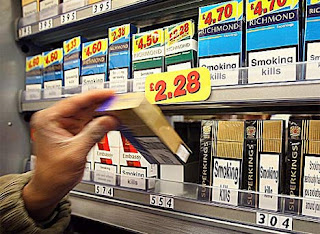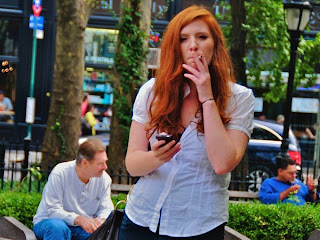
In the play by Tennessee Williams, "A Cat on a Hot Tin Roof," there is a scene where the character, Harvey "Big Daddy" Pollitt, annoyed with the lies surrounding him, uttered these words: "There ain't nothin' more powerful than the odor of mendacity!" With all the demagoging I have read in the papers concerning the reduction of "10 cents a pack in the cigarette tax," I must say I do smell something in the air that is not cigarette smoke but indeed mendacity.
Whenever I discuss this topic I always inoculate myself by saying I have never smoked and have no idea why anyone smokes. There is no question this is a bad habit that is not good for one's health. No one can refute those facts. The recommendation by the Ways and Means Committee (WMC) to lower the tax by 10 cents a pack was simply driven by the need to restore falling cigarette tax revenue. Being a state rep. on the WMC I had a front row seat to the discussion. Let's explore the facts:
1. The cigarette tax increased 98 cents a pack from 80 cents in FY 2007 to $1.78 in FY 2010.
2. The cigarette tax revenue did increase during that period to a point in which it now represents the fourth largest revenue stream behind the state-wide property tax, business profits tax (BFT), and the business enterprise tax (BET).
3. In FY 2011 the actual cigarette tax revenue dropped $7.7 million from FY 2010 levels indicating that we hit the "tipping point" in which the increased tax resulted in reduced total revenue. That is correct. Revenues are down because the tax rate was increased too much.
4. In the WMC we heard testimony from grocery stores, convenient store chains, and "mom & pop" convenient stores from all along the Massachusetts, Maine, and Vermont border. They indicated a drop in cigarette sales because the price per pack differential between New Hampshire and the border state prices has been reduced (especially with Maine). This has resulted in border state customers not coming across the border to buy cigarettes as they once did. The problem is when these lost customers came across the border they bought many other products including gasoline (18 cents per gallon gasoline tax), lottery tickets (lottery revenue), alcohol (lost profit from our liquor stores that goes to the general fund), and other items increasing profit and the number of employees in jobs (impacting the BPT revenues and BET revenues respectively).
5. In the WMC we heard testimony from an individual familiar with the cigarette distribution center in Contoocook that distributes cigarettes in New England. He said cigarette sales were up everywhere in New England with the exception of New Hampshire. His message was the citizens in N.H. weren't smoking any less because of the increased taxes, but smokers from border states simply are not coming to N.H. to buy their cigarettes as they once did. Instead they are buying cigarettes in their home states at record numbers, especially in Maine. This is strong evidence these tax increases have not reduced smoking in N.H., but simply reduced cross-border sales.
6. There was a study conducted by two economics professors at Southern New Hampshire University indicating the reduction in the cigarette tax would lead to $11.8 million increase in revenue. Since I know something about multivariate analysis I sat down with the two professors to confirm their math was correct. Their overriding conclusion was the calculus for N.H. is different than other states because of our strong border state sales.
7. There were all the phone calls, emails, and letters from older citizens saying the cigarette tax increases in recent years were hurting them. I engaged many of these folks who indicated to me at their age they did not want to give up smoking. I even tried to talk them into quitting. The bottom line is the cigarette tax is a very regressive tax hurting our elderly and the poorest among us.
8. The WMC heard testimony from representatives from organizations such as American Heart Association and the American Cancer Society presenting all that is bad about smoking. It is safe to say all on the WMC were already familiar with their arguments and facts. We are not the policy committee who normally would hear this type of testimony; our charge is to focus on the revenue ramifications of this tax. At one point, I suggested that their organizations file a bill at the national level to ban cigarette sales totally and told them I would support it. Then I paused and said the dirty little secret is that every state is addicted to the cigarette tax. The hypocrisy of the whole discussion is that those who want even higher taxes on cigarettes for health reasons would not want to see the loss of all tobacco revenue because of the social programs it funds.
9. The House, Senate and governor in a bipartisan fashion repealed the 10 percent gambling tax this session. There are those who say gambling is an addiction and thus a health risk. So why was there no outcry against the repeal of the gambling tax by the same folks demagoging the cigarette tax reduction? From a WMC view, both the gambling tax and increases in the cigarette tax resulted in lost revenue to the state in FY 2010, through reduced lottery sales and gaming revenues, as well as, from lost cigarette sales to the border states. The same basic economic principal was in play, but resulted in selective outrage.
I have already heard from store owners thanking the Legislature for this tax reduction just as I have heard similar thanks concerning the elimination of the gambling tax. These moves have been good for business which is good for keeping jobs within our state and an increased flow of revenue to the general and education funds. We on the WMC will keep a close eye on the impact of both these actions which were designed to help business and to increase state revenue.
As for the children smoking argument, my response is, "Let's not confuse tax policy with good parenting." When my children were in high school, the cigarette tax was 37 cents a pack. Cigarettes were very cheap then, but my children never smoked. As parents, we taught our children well. Society must rely on parents to properly guide children and not defer to tax policy to magically do the job of protecting its children from any unhealthy practices.
Patrick Abrami is a resident of Stratham and serves as District 13 state rep. for Exeter, Stratham, North Hampton.





